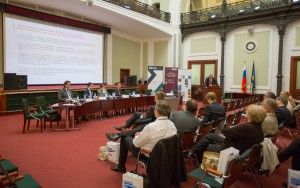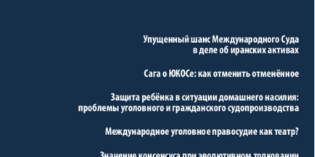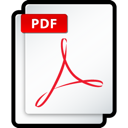Russian Arbitration Day 2014: Arbitration in Russia Undergoing Turbulence
 The international conference Russian Arbitration Day took place on 29 May in Moscow. The event focused on key issues concerning the development of international commercial arbitration on Post-Soviet territory.
The international conference Russian Arbitration Day took place on 29 May in Moscow. The event focused on key issues concerning the development of international commercial arbitration on Post-Soviet territory.
It was the second such conference held by the International Commercial Arbitration Court at the Chamber of Commerce and Industry of the Russian Federation. A number of Russian and international law firms supported the event: Berwin Leighton Paisner LLP and its Russian practice Goltsblat BLP, Muranov Chernyakov & Partners, Monastyrsky Zyuba Stepanov & Partners, Watson Farley & Williams.
This year discussions at the Russian Arbitration Day focused, inter alia, on the forthcoming radical reforms to domestic and international arbitration regulation. The draft laws prepared by the Ministry of Justice of the Russian Federation have already provoked heated debates among specialists.
Among the speakers of the event one can mention Alexey Kostin (Chairman of the International Commercial Arbitration Court and the Maritime Arbitration Commission), Dominic Pellew (Solicitor of the Supreme Court of England and Wales), Christoph Liebscher (Partner at the Vienna office of Wolf Theiss), Roman Khodykin (Partner at the London office of Berwin Leighton Paisner), Alexander Muranov (managing partner of Muranov, Chernyakov & Partners law firm) and other leading experts.
The organisers dedicated the first session of Russian Arbitration Day 2014 – “Legislative reforms in the international arbitration sphere” – to the memory of Professor М.G. Rozenberg, a major arbitration expert who passed away in 2013.
In her speech the deputy Minister of Justice of the Russian Federation, Elena Borisenko, noted that the amendments to the arbitration laws resulted from wide-spread difficulties with enforcement of their awards. The bases for non-enforcement of such awards are numerous: “puppet” arbitrations, fraudulent schemes in connection with issuance of backdated arbitration awards, etc. As a result, the persons applying to arbitration were not always sure that their award would be enforced. The effect was that the trust of society in arbitration courts was rapidly decreasing.
A.A. Kostin focused on reforms of the legislation on arbitration praising the positive nature of such changes. Among the positive aspects he singled out increased attention to arbitration on the part of mass media, state and business. It has resulted in draft laws on arbitration being prepared with the active participation of the general public.
According to Alexander Muranov, one of the conference moderators, at the first session the organisers of Russian Arbitration Day intentionally avoided discussing purely domestic Russian legislative projects because the legal community had “got tired” of disputes surrounding them, instead deciding to place emphasis on the international experience. In other sessions the experts concentrated on specific arbitration issues, which had not received sufficient attention until then.
Thus, during the second session – “Current Issues of Arbitration” – the focus was on tendencies and reforms in the Western arbitration world, in particular, on the prospects of creation of an appeal procedure inside the arbitration proceedings system.
In 2013 the International Center for Dispute Resolution / the American Arbitration Association (ICDR/AAA) made a revolutionary amendment to its rules, that is, it introduced the appeal procedure against an arbitral award. Will it be a new trend? Should Russian arbitral institutions follow this example? The conference attendants saw a video report on this issue by the co-author of the said amendments to the rules – James Hosking of Chaffetz Lindsey LLP law firm, Lecturer of the law department of the University of Pennsylvania.
Sergey Usoskin presented an interesting report on the Moscow Convention for the Protection of Investors’ Rights while Noah Rubins analysed Russian investment legislation in general. Vilija Vaitkutė Pavan voiced an innovative opinion in her speech dealing with anti-suit measures (a new notion for Russian legal doctrine).
From her point of view, one should discern between anti-arbitration measures and anti-suit measures. That is, if the first group of measures aims at preventing the case hearing at the arbitration court or at enforcement of the arbitral award, the second group, on the contrary, seeks to prevent cancellation or review of the arbitral award.
The third conference session concerned procedural issues in arbitration. Among other speakers, Andrey Panov, Senior Associate of Norton Rose Fulbright (Central Europe) LLP, Magister Juris (University of Oxford), gave his speech on the prospects of online arbitration. He emphasised that the only serious advantage of this type of arbitration was its convenience (all other benefits like the reduction of time and funds spent are quite dubious). There are clearly other deficiencies: compliance with the written form, determination of the place of arbitration, notification of the parties, identification of the representatives, authenticity of evidence, confidentiality. Nevertheless, in light of the increasing volume of e-commerce electronic arbitration is becoming more and more necessary.
As an outcome of the conference, Infotropic Media publishing house issued a collection of articles “New Horizons of International Arbitration. Issue 2”, including both reports of the speakers and research works of the authors who could not make a speech due to the strict time limits.














